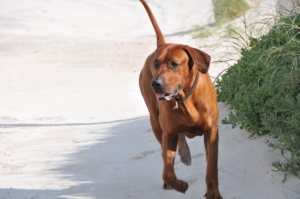Preventive Health Care
Why Preventive Health Care is Important for Rhodesian Ridgebacks
Rhodesian Ridgebacks, like all breeds, can be prone to specific health conditions. By focusing on preventive care, you can reduce the risk of common issues like hip dysplasia, heart disease, and skin allergies. Regular veterinary visits, proper nutrition, and routine exercise are the cornerstones of preventive health care for Ridgebacks.
Key Preventive Health Care Steps for Rhodesian Ridgebacks
-
Routine Veterinary Check-ups
Regular vet visits are crucial for monitoring your Rhodesian Ridgeback’s health. Your veterinarian will conduct annual physical exams to detect early signs of illness and ensure vaccinations are up-to-date. In addition to general health assessments, routine blood work and screenings for parasites can help identify any underlying conditions. -
Vaccinations and Parasite Prevention
Keeping your Ridgeback up-to-date on vaccinations is vital for protecting them from diseases like distemper, rabies, and parvovirus. Additionally, parasite prevention, including flea, tick, and heartworm prevention, is essential. Consult with your vet to determine the best vaccine schedule and preventive medications for your dog’s lifestyle. -
Diet and Nutrition
Proper nutrition is essential to maintaining your Rhodesian Ridgeback’s health. Feed your dog a balanced diet that supports their energy needs, maintains healthy joints, and keeps their coat shiny. Ridgebacks are prone to obesity, so it’s crucial to monitor their weight and avoid overfeeding. High-quality dog food that suits their age, size, and activity level is key. -
Exercise and Mental Stimulation
Rhodesian Ridgebacks are active dogs that require daily exercise to stay healthy and happy. Regular exercise helps to maintain healthy weight, improves cardiovascular health, and reduces the risk of joint issues. As intelligent dogs, they also benefit from mental stimulation, so include activities that challenge their problem-solving abilities, such as puzzle toys and obedience training. -
Dental Care
Dental health is often overlooked, but it plays a significant role in your Ridgeback’s overall well-being. Regular brushing and dental chews can help prevent gum disease and tooth decay. Periodontal disease can lead to more serious health issues, so establish a dental care routine early. -
Joint and Hip Health
Rhodesian Ridgebacks are prone to hip dysplasia and other joint issues due to their large size and active nature. Preventive measures include providing joint supplements, ensuring a balanced exercise routine, and avoiding excessive strain on their joints, especially during their growing years. Regular vet checks can help identify early signs of hip dysplasia or arthritis. -
Grooming and Skin Care
Rhodesian Ridgebacks have short coats that require minimal grooming. However, they are susceptible to skin conditions, including allergies and infections. Regular brushing, bathing, and checking for any abnormalities such as rashes, bumps, or infections can help maintain their skin health. Also, pay attention to their ridge (the distinctive hair pattern along their back), as it can sometimes be prone to skin issues.
Early Detection and Monitoring
Preventive health care for Rhodesian Ridgebacks involves more than just routine vet visits and proper care. It also means being proactive in monitoring your dog’s behavior and appearance. Watch for any signs of discomfort, lethargy, unusual eating habits, or changes in coat quality. If you notice anything out of the ordinary, consult your veterinarian promptly.
Conclusion
Preventive health care is essential for ensuring your Rhodesian Ridgeback remains happy, healthy, and active throughout their life. By focusing on regular veterinary visits, vaccinations, nutrition, exercise, and grooming, you can significantly reduce the risk of serious health problems. Early detection of potential issues through preventive care ensures that your Rhodesian Ridgeback enjoys a fulfilling and long life as your loyal companion.

